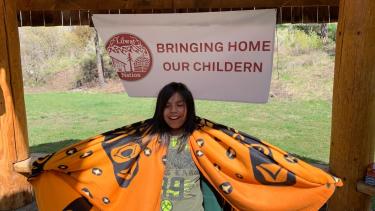
Going Home
Harlem arrived at my school in September 2021 with a G4 file as thick as my fist. It stated that he had been in foster care for 11 years, rarely attended school, and could become violent if he became frustrated. He had been in foster care since birth and had been mainly homeschooled by his foster parents who did not value public school or his culture. When I first met him, it became apparent that we were not dealing with a violent or mean child but a soft-spoken, gentle, and curious boy. It also became apparent that we were enrolling a student who had no exposure to his Indigenous roots or culture. Harlem demonstrated no interest in his culture and appeared to be ashamed of who he was.
Over the next 7 months, Harlem was introduced to his Indigenous culture and given the needed educational support as stated by Jordan’s Principle which asserts that, “all First Nations children living in Canada can access the products, services, and supports they need when they need them.”
Our school’s Indigenous Support Worker, Courtney Graham, provided him with special Indigenous foods, cultural lessons, and special drum-making sessions. Ms. Graham became the first Indigenous role model in Harlem’s life that he could look up to and trust. His classroom teacher also welcomed him and provided an environment that demonstrated respect and value for the history of First Nations peoples, as well as a deeper understanding of Indigenous cultures and perspectives. Over the next 6 months, Harlem began to see school as a safe, welcoming and respectful place that not only taught Indigenous culture but showed him how to be proud of it.
It came as a surprise in late March of 2022 when Harlem failed to show up at school. After a few days of not being at school, we contacted the home and social worker to discover that the Ministry of Family and Children had decided that Harlem and his younger sister were ready to go home to the Lil'wat Nation. The initial reaction of the staff was that of sadness and loss, but over the next few weeks, it became clear that the support which the school staff had provided over the last 6 months had been a critical part of getting Harlem ready to go home to his original nation of Lil'wat .
When he arrived in Lil'wat, not only was he welcomed into his uncle's home, but he also saw the culture and way of life that he had learned about in the classroom. Harlem felt instantly felt at home.
The educators at Mountain Elementary played a key role in teaching Harlem about his culture and helping him become proud to be Indigenous. This made for a smoother transition back home as he became a part of the Lil'wat Nation again. For Harlem, the school had come to represent a place of healing and safety so much so that teachers, support staff, and administration were welcomed to the Lil'wat Nation by Chiefs to be a part of the homecoming ceremony for Harlem and his sister. This experience helped my school staff come to realize that educators play a pivotal role in truth and reconciliation.
CAMERON FRIESEN, PRINCIPAL
Mountain Elementary